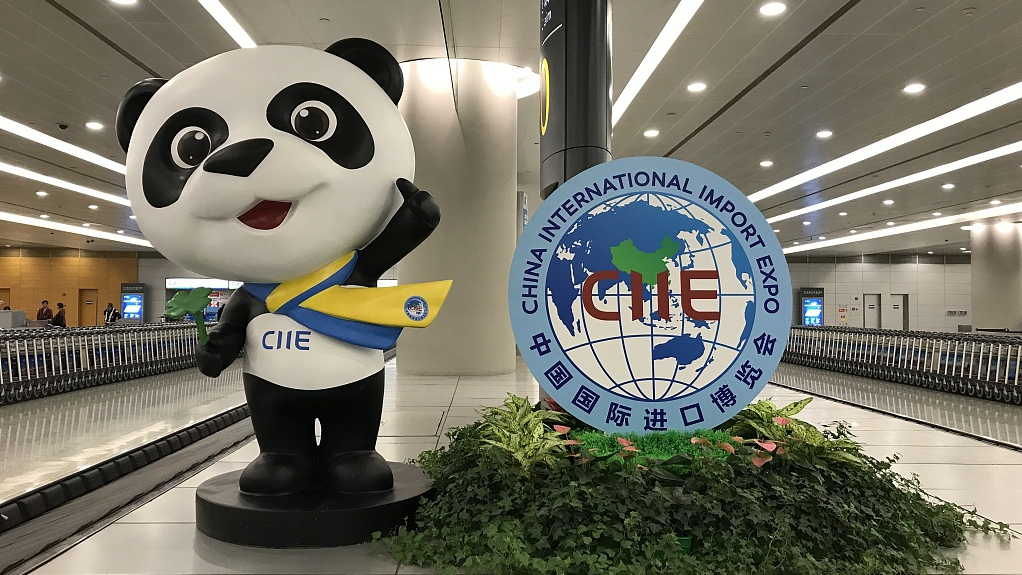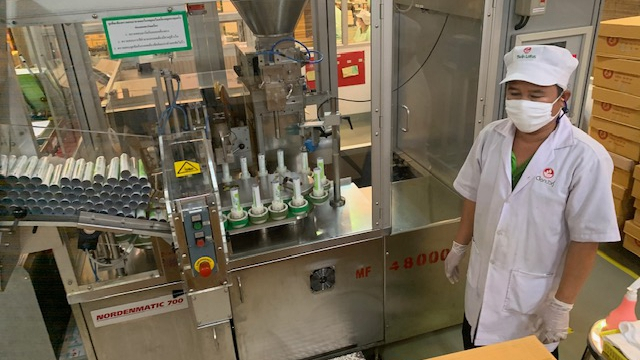Notwithstanding a recent thaw in relations, U.S. President Donald Trump's "America First" policy – imposed to combat trade deficits with overseas nations – sparked a trade war with China.
The U.S. move was widely seen as protectionist and a direct contrast to China's Belt and Road initiative aiming to forge partnerships and spur global trade. The imposition of tariffs by both sides has seen a fall in the volume of U.S. products being imported into China.
China could wait out the U.S. or take actions. One swift move was the creation of the China International Import Expo, or CIIE. The CIIE is designed to provide a gateway for foreign companies seeking to enter the Chinese market and their goods will replace many of those the U.S. is withholding.
The second CIIE will take place in Shanghai from November 5 to 10.
A major market for Thailand and the whole world

CIIE mascot Jinbao welcomes global guests. /VCG Photo
CIIE mascot Jinbao welcomes global guests. /VCG Photo
Companies around the globe see China as a major target market. In 2017, China imported goods worth 1.7 trillion U.S. dollars, making it the world's second largest importer.
"China has a middle-income population of 400 million, which is growing rapidly and has great consumption potential in terms of both the total amount and diversity of demand," said Zhang Xiaotao, Dean of the School of International Economics and Trade at the Central University of Finance and Economics in Beijing.
To the close neighbors in Southeast Asia, China is a key market. It is also the number one export destination for products made in Thailand. For many Thai businesses, the CIIE is an opportunity for expansion and a firm date in their marketing diaries.
Why do Thai companies value CIIE?
Thai healthcare manufacturer Twin Lotus, based in Bangkok, attended the first CIIE in 2018 and is present again this year. Its best-selling products are soap and herbal toothpaste.
"For us it is an opportunity to showcase our products," said Twin Lotus' managing director Kamthon Leelertphan. "We can present our products to the Chinese audience. There are many participants who come from different cities all over the country want to trade in the traditional way or through supermarkets or online."
"We have been in China since 2006 and our sales double each year," he added.

Twin Lotus is a Thai company exhibiting at CIIE. /CGTN Photo
Twin Lotus is a Thai company exhibiting at CIIE. /CGTN Photo
The export of Thai organic products to China is now worth 2.5 billion U.S. dollars a year. That is just part of a far larger trading partnership. Two-way trade between Thailand and China is currently worth 80 billion U.S. dollars annually, with both sides looking to increase that to 100 billion U.S. dollars.
Thailand's top three exports to China are rubber, machinery and plastics, which are worth a yearly total of 12 billion U.S. dollars. China's top product sales to Thailand are electronics, power generation components and iron and steel, amounting to 26 billion U.S. dollars.
Leelertphan added: "Many companies might be wary of selling in China because you need to understand the culture and the habits, that is very important."
"I think CIIE helps a lot, many people might not have the information on how to exhibit their goods. The Chinese market is the second biggest in the world now and there are a lot of products the Chinese like to import," said the managing director. "I think this event is a good place to start and a good place for people to showcase the whole market, to anybody who is interested in importing anything from outside China."
Two-thirds of Thailand's national wealth comes from exports and China is Thailand's major trading partner. It is an important relationship for both countries, a partnership that's helped many companies see rapid growth.
Although only in its second year, many companies in Asia and beyond see the CIIE as a must-attend event.